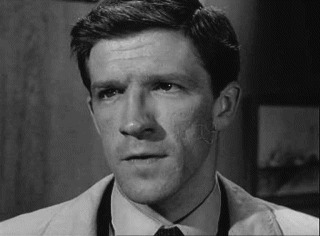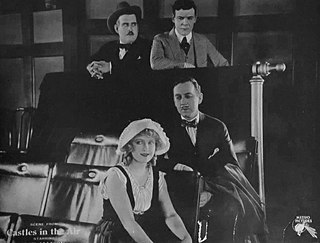
Charles Laughton was a British-American actor. He was trained in London at the Royal Academy of Dramatic Art and first appeared professionally on the stage in 1926. In 1927, he was cast in a play with his future wife Elsa Lanchester, with whom he lived and worked until his death.

The Green Goddess is a 1930 American pre-Code film directed by Alfred E. Green. It was a remake of the 1923 silent film, which was in turn based on the play of the same name by William Archer. It was produced by Warner Bros. using their new Vitaphone sound system, and adapted by Julien Josephson.

Nicholas Peter John Hornby is an English writer and lyricist. He is best known for his memoir Fever Pitch and novels High Fidelity and About a Boy, all of which were adapted into feature films. Hornby's work frequently touches upon music, sport, and the aimless and obsessive natures of his protagonists. His books have sold more than 5 million copies worldwide as of 2018. In a 2004 poll for the BBC, Hornby was named the 29th most influential person in British culture. He has received two Academy Award for Best Adapted Screenplay nominations for An Education (2009), and Brooklyn (2015).

James Maxwell was an American-British actor, theatre director and writer, particularly associated with the Royal Exchange Theatre in Manchester.

Stephen Arthur Frears is an English director and producer of film and television often depicting real life stories as well as projects that explore social class through sharply drawn characters.

James Francis Ivory is an American film director, producer, and screenwriter. For many years, he worked extensively with Indian-born film producer Ismail Merchant, his domestic as well as professional partner, and with screenwriter Ruth Prawer Jhabvala. All three were principals in Merchant Ivory Productions, whose films have won seven Academy Awards; Ivory himself has been nominated for four Oscars, winning one.

Paul Greengrass is a British film director, film producer, screenwriter, and former journalist. He specialises in dramatisations of historic events and is known for his signature use of hand-held cameras.

Victor Saville was an English film director, producer, and screenwriter. He directed 39 films between 1927 and 1954. He also produced 36 films between 1923 and 1962.

Journey's End is a 1930 British-American war film directed by James Whale. Based on the play of the same name by R. C. Sherriff, the film tells the story of several British army officers involved in trench warfare during the First World War. The film, like the play before it, was an enormous critical and commercial success and launched the film careers of Whale and several of its stars.

The Broken Melody is a 1938 Australian drama film directed by Ken G. Hall and starring Lloyd Hughes, based on a best-selling novel by F. J. Thwaites.
The Flag Lieutenant is a 1932 British war film based on the play by William Price Drury and directed by and starring Henry Edwards, Anna Neagle, Joyce Bland, and Peter Gawthorne. The film's plot involves a lieutenant who is wrongly accused of cowardice.

The Middle Watch is a 1940 British comedy film, directed by Thomas Bentley and starring Jack Buchanan, Greta Gynt, Fred Emney and Kay Walsh. It was produced by Associated British Picture Corporation at their Welwyn Studios. It was based on a play of the same title by Ian Hay and Stephen King-Hall which had previously been adapted as a film in 1930, and which was adapted again in 1958.
Just William is a United Kingdom television series first broadcast on BBC One in December 2010. The series is based on the Just William series of books by Richmal Crompton. This latest adaptation is written by Simon Nye. It is the first adaption of the books since a children's television series in the 1990s.

The Bells is a play in three acts by Leopold David Lewis which was one of the greatest successes of the British actor Henry Irving. The play opened on 25 November 1871 at the Lyceum Theatre in London and initially ran for 151 performances. Irving was to stage the play repeatedly throughout his career, playing the role of Mathias for the last time the night before his death in 1905.
Adam Bede is a 1918 British silent drama film directed by Maurice Elvey and starring Bransby Williams, Ivy Close and Malvina Longfellow. It is an adaptation of the 1859 novel Adam Bede by George Eliot.
The Gay Lord Quex is a 1917 British silent comedy film directed by Maurice Elvey and starring Ben Webster, Irene Vanbrugh and Lilian Braithwaite. It is based on the 1899 play The Gay Lord Quex by Arthur Wing Pinero.
The House of Temperley is a 1913 British silent drama film directed by Harold M. Shaw and starring Charles Maude, Ben Webster and Lillian Logan. It is based on the 1896 novel Rodney Stone by Arthur Conan Doyle and is sometimes known by the alternative title Rodney Stone. The House of Temperley was the first film made by the London Film Company and first shown in Nottingham.

Marriage For Convenience is a 1919 silent film drama directed by Sidney Olcott and starring Catherine Calvert.

Castles in the Air, also known by its working title Orchestra D-2, is a 1919 American silent comedy film, directed by George D. Baker. It stars May Allison, Ben Wilson, and Clarence Burton, and was released on May 12, 1919.

The Man Who Bought London is a 1915 crime novel by the British writer Edgar Wallace. It was originally published as a magazine serialisation.















